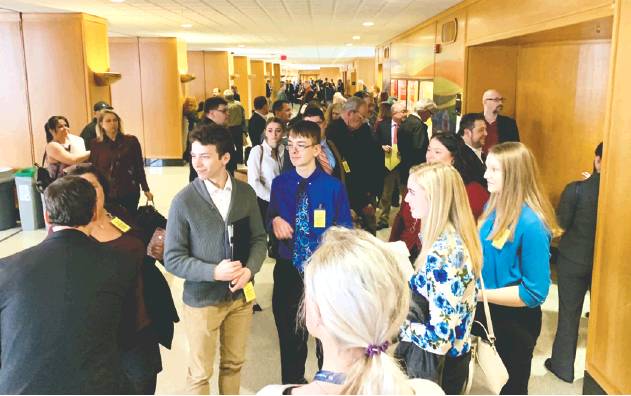Students push for mental sick days
Utah and Oregon have passed laws allowing such absences, which supporters say could save lives
BY WILLIAM WAN
In the face of rising rates of depression, anxiety and suicide among young people, some states and school systems have started allowing students to take mental-health days off from school.
Last year, Utah changed its definition of valid excuses for absences to include mental health issues. This summer, Oregon enacted a law — driven by a group of high school student activists — that allows students to take days off for mental health.
Students in other states, including Colorado, Florida and Washington, are attempting to get similar laws passed.
“High school can be a lonely, difficult place to begin with,” said Hailey Hardcastle, 19, who spent months lobbying for the Oregon law as a high school senior. “But there’s so much more pressure these days — getting into college, the social pressure, even just the state of the world and what you’re exposed to with climate change, and everything going on with politics. A lot of times it can feel like the world is about to end.”
Hardcastle and others encountered skepticism and resistance from lawmakers who worried that students would use mental health days as an excuse to skip school or that such a law would coddle young people.
But mental health problems among youths have been on a steady, alarming rise in recent years. A study this year showed a steeper hike in reports of mental distress, depression and suicidal thoughts among teens and young adults than in people of other ages.
Suicidal thoughts among teens ages 18 or 19 increased 46 percent from 2008 to 2017, and suicide attempts among people ages 22 or 23 have doubled. A study from the Centers for Disease Control and Prevention showed that the rate of suicide increased by 56 percent from 2007 to 2017 among people ages 10 to 24. Suicide, in recent years, has become the secondmost-common cause of death among teens and young adults. It has overtake homicides and is outpaced only by accidents.
Experts cannot easily explain the mental illness epidemic among youths. Some have attributed it to lack of community, the rise of social media, bullying or less sleep.
“I don’t think there’s one single answer,” said Jennifer Rothman, a senior manager at the National Alliance on Mental Illness. “But we know there’s a real need to do something about it. And these mental sick days are a way to at least end the silence and talk about the problem.”
In Oregon, the idea for mental sick days came up at a summer camp of student leaders from high schools throughout the state, said Hardcastle and others who attended. Many students talked about suicides by friends and friends of friends. Some talked openly about their own struggles with mental illness.
The student leaders created a new group — Students for a Healthy Oregon — and enlisted the help of psychologists and lobbyists to volunteer as advisers.
“We helped them figure out which legislators they needed to get on board and things like how to organize a letter-writing campaign,” said Robin Henderson, a psychologist and chief executive for behavioral health for the Providence Medical Group in Oregon. “It was surprising the amount of pushback they got.”
Before the law, Oregon students could have up to five days of excused absences in a threemonth period for physical illness, doctor or dentist appointments or a family emergency. Outside those circumstances, they often would not be allowed to make up tests or homework they missed.
Some lawmakers grilled the students on their proposal. At a legislative hearing in April, state Sen. Mark Hass (D) said, “One of the things we’re dealing with up here is chronic absenteeism . . . that affects graduation rates.”
State Sen. Dallas Heard (R) said he believes students need to toughen up: “If we simply just start saying . . . that there really is no consequence for ramping up this idea that we should not have to come to work or practice or to school because we’re having a bad day . . . I’m concerned that’s going to continue to start eroding our society to the point where we have much, much bigger issues.”
Trying to answer the lawmakers’ concerns, high school senior Derek Evans responded, “The bottom line of this is there will be students that will abuse the system but there will be students that this will save.”
Evans talked about his struggles with anxiety and depression, and how recently — after being a longtime 4.0 student — he had to take four days off for mental health and was sternly warned by administrators that he would fail if he did not return to school immediately.
“The system appears not to support our students but to force them into classes when they are far from healthy,” Evans said.
Allowing students to take mental sick days could help parents and counselors take notice and spark conversations, other students said at the hearings.
“One the biggest problems that persists with mental health is the stigma around it,” Amit Paley, CEO and executive director of the LGBTQ youth suicide prevention group the Trevor Project, said in an interview. “If a young person can feel comfortable saying ‘I need help,’ that can be life-changing for a young person. It’s really different than having to lie about what’s going on just to take a sick day.”
This summer, after a year of lobbying, letter writing and testifying at their state capitol, the students in Oregon got their bill signed into law and enacted. Since then, they have been advising student leaders in other states who are interested in getting similar laws passed.
In Colorado, students are working with officials to try to introduce a bill when the state legislature reconvenes in January.
